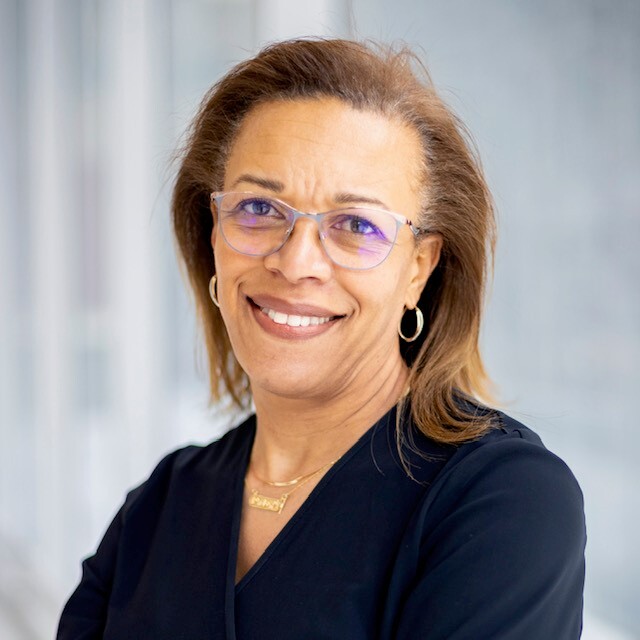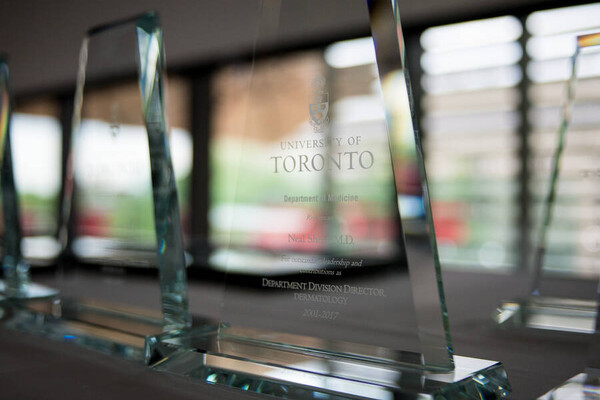Main Second Level Navigation
- Welcome
- Why Toronto?
- History of the Department
- Vision & Strategic Priorities
- Our Leadership
- Our Support Staff
- Location & Contact
- Departmental Committees
- Department of Medicine Prizes & Awards
- Department of Medicine Resident Awards
- Department of Medicine: Self-Study Report (2013 - 2018)
- Department of Medicine: Self-Study Report (2018 - 2023)
- Communication Resources
- News
- Events
Celebrating a lifetime of achievement in medicine

Dr. Mireille Norris’ journey as a Black, French-speaking geriatrician and teacher has not only broken barriers, but also paved the way for countless aspiring medical professionals. The recent honour of receiving the Black Physicians of Canada’s (BPC) Lifetime Achievement Award stands as a testament to her remarkable career and the path she has forged for others.
Dr. Norris was born in Haiti to a family that prioritized education and learning. Her early years were steeped in the French language as she completed elementary school, high school and her university education in Quebec. Despite her strong foundation in French, a turn of events led her to embark on a career in medicine and a lifelong commitment to bilingualism.
Inspired by her aunt, who was working as a hematologist in New York, when the time came to apply for university, Dr. Norris’ dream was to study medicine. In addition to applying to medical school, she selected biology as her second choice at a French university and physical therapy as her second choice at McGill University in Montreal. When she wasn't initially accepted into medicine, her aunt encouraged her to consider starting her career and improving her English by studying physical therapy at McGill.
“I didn’t hear a word of English until I was eight years old and then I did a crash course to improve my English before starting McGill’s physical therapy program,” says Dr. Norris.
Her determination allowed her to later enter medical school at Université de Montreal. The experience of constantly switching between languages, often translating materials from English to French as English textbooks were more recent, was invaluable in developing her fluency. Dr. Norris also wrote her United States Medical Licensing Examination during medical school, which helped her to feel secure in her ability to later complete Geriatric Medicine training at the University of Toronto (U of T) in English.
When asked about her choice to specialize in Geriatric Medicine, Dr. Norris explains that she had initially planned to pursue neurology but found herself drawn to geriatrics during her first year of internal medicine rotations. Her supervisors recognized her potential and encouraged her to explore the specialty, even guiding her through research projects that eventually were published.
“I knew Dr. Josée Verdon, who is also a Francophone physician, and she felt that U of T had a strong postgraduate medical education program, so she encouraged me to apply and even introduced me to Michael Gordon, who was the President of Medical Affairs at Baycrest, as well as U of T’s Divisional Director of Geriatric Medicine at the time, Dr. Barry Goldlist,” says Dr. Norris. “This was shortly after the 1995 Quebec referendum when the separatist movement blamed their loss on the ‘ethnic vote,’ and that also encouraged me to continue my training at U of T.”
Her decision to stay at U of T long-term was motivated by the welcoming atmosphere she experienced there and the fact that Dr. Goldlist advocated for changes that allowed Dr. Norris to begin her residency in January, as opposed to July, in order to accommodate her maternity leave. Dr. Norris says that Toronto's diverse community also helped her to feel at home and inspired her to continue her education.
She went on to complete a master's degree in hospital administration from the Dalla Lana School of Public Health. This additional education empowered her to launch the Hospitalist Training Program at Sunnybrook in 2005 – an initiative that became a model for similar programs across the country and helped over 120 underrepresented in medicine (URiM) physicians access residency and jobs in the Canadian healthcare system during its 18 years in operation.
Dr. Norris is a believer in the power of mentorship. From her own experiences, she recognizes the unique challenges equity-deserving trainees can face in terms of mentorship, access to research, representation and discrimination.
“For people who come from oppressed groups that have experienced injustice, in order to overcome those barriers, they need to have mentors that come from these same groups and can validate their experiences of trauma and discrimination to help them move toward a preferred future,” says Dr. Norris.
Her commitment to addressing such barriers led to the creation of the Sunnybrook Program to Access Research Knowledge (SPARK) in 2021, which provides meaningful paid research externships for Black and Indigenous medical students. Dr. Norris asserts that this program would not have been possible without her co-leads – Dr. Jill Tinmouth, Dr. Nick Danerman and Dr. Csilla Kalocsai, an education scholar who has helped to evaluate and disseminate the program.
Dr. Norris’ passion for mentorship also extends to her teaching role, where she emphasizes the importance of encouraging her students to strive for excellence.
“I’ve been lucky to receive funding from the Department of Medicine, U of T, the Black Physicians’ Association of Ontario and Sunnybrook to study the experience of Black physicians participating in the BPC's racially concordant mentorship program, launched in 2021 by Dr. Modupe Tunde-Byass, Chair of the Mentorship Committee and President of BPC, says Dr. Norris.
“Preliminary results showed the impact a racially concordant mentorship program had on resident and early career physician wellness, as well as benefits in regard to navigating life and career, dealing with micro-aggressions and imposter syndrome. That's why having these types of programs are crucial for ensuring that individuals from under-represented groups succeed as physicians.”
This year, Dr. Norris' outstanding contributions to her field were acknowledged by being awarded the BPC's Lifetime Achievement Award.
“While I know what my intentions and goals are, I don’t always appreciate the impact my actions have had on others,” says Dr. Norris. “To receive this award is incredibly moving – it makes me feel recognized and valued.”
Looking to the future, she is committed to nurturing the next generation of medical leaders. Dr. Norris continues to work with the Department of Medicine to support emerging academic leaders through the Temerty Faculty of Medicine’s New and Evolving Academic Leaders (NEAL) program. Her vision is to see more Black and Indigenous medical professionals excel in their careers, driven by a sense of belonging.
“To others who have felt disenfranchised or excluded, I would tell them to follow their passion, have courage in the face of obstacles, surround themselves with people who support them and to take a risk,” she says.

